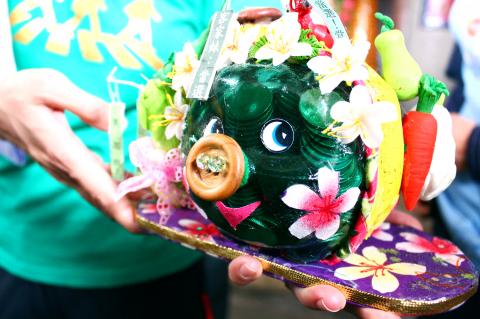Taiwan needs to make an immediate effort to tackle the problem posed by its aging population by establishing a comprehensive elderly-care system with significant government commitment, Democratic Progressive Party (DPP) Chairperson Tsai Ing-wen (蔡英文) said in Miaoli City yesterday.
Tsai, the DPP presidential candidate, reiterated her platform on care for the elderly, saying that there needs to be three levels of care to form a sound system — home care, community-based care and institutional care — so that “no one would be left behind.”
There was no better place to elaborate the policy than Miaoli County, which has among the most rapidly aging populations in the nation, Tsai said on the second day of her four-day visit through high-concentration Hakka constituencies.

Photo: Ho Tsung-han, Taipei Times
Overall, she said, senior citizens account for 10.7 percent of Taiwan’s population of 23 million and the percentage is expected to increase to 16 percent by 2020.
If preschool children are taken into account, one in three Taiwanese would need social care services in the near future, Tsai said at a retirement home in a Miaoli City suburb.
President Ma Ying-jeou’s (馬英九) administration has not been doing enough, nor has it been tackling the issue quickly enough, Tsai said, adding that Ma had dumped the “social safety net” program planned by the previous DPP administration.
If she were elected in January, Tsai said, her first priority would be improving medical care resources and the nation’s infrastructure, particularly in Miaoli County, before the eventual establishment of a comprehensive long-term social care system in 10 years.
Since “speed” would be crucial, she said, massive government resources would be deployed in the program in the first three years of her administration.
There should be as many publicly funded and publicly operated institutions as possible, while some of them could be publicly funded private institutions, she said.
Speaking earlier in the Lioudong (流東) community, located in Toufen Township (頭份), Miaoli County, Tsai said the community served as a model for community-based elderly care.
Dedicated volunteers in the close-knit community have helped retired and semi-retired senior citizens, most of which had worked as farmers, to work and pass down their expertise and cultural heritage to the younger generations, she said.
Liudong symbolized her vision for Taiwan’s rural communities in the future, which combine modern and advanced agricultural development, community-based elderly care and development of the local economy — three crucial elements in her domestic policy.
Tsai will be traveling through high-concentration Hakka areas in Taoyuan and Hsinchu counties today and tomorrow to drum up support for her presidential campaign after recent visits through the east and west coasts boosted her support, some sources said.

An essay competition jointly organized by a local writing society and a publisher affiliated with the Chinese Communist Party (CCP) might have contravened the Act Governing Relations Between the People of the Taiwan Area and the Mainland Area (臺灣地區與大陸地區人民關係條例), the Mainland Affairs Council (MAC) said on Thursday. “In this case, the partner organization is clearly an agency under the CCP’s Fujian Provincial Committee,” MAC Deputy Minister and spokesperson Liang Wen-chieh (梁文傑) said at a news briefing in Taipei. “It also involves bringing Taiwanese students to China with all-expenses-paid arrangements to attend award ceremonies and camps,” Liang said. Those two “characteristics” are typically sufficient

A magnitude 5.9 earthquake that struck about 33km off the coast of Hualien City was the "main shock" in a series of quakes in the area, with aftershocks expected over the next three days, the Central Weather Administration (CWA) said yesterday. Prior to the magnitude 5.9 quake shaking most of Taiwan at 6:53pm yesterday, six other earthquakes stronger than a magnitude of 4, starting with a magnitude 5.5 quake at 6:09pm, occurred in the area. CWA Seismological Center Director Wu Chien-fu (吳健富) confirmed that the quakes were all part of the same series and that the magnitude 5.5 temblor was

The brilliant blue waters, thick foliage and bucolic atmosphere on this seemingly idyllic archipelago deep in the Pacific Ocean belie the key role it now plays in a titanic geopolitical struggle. Palau is again on the front line as China, and the US and its allies prepare their forces in an intensifying contest for control over the Asia-Pacific region. The democratic nation of just 17,000 people hosts US-controlled airstrips and soon-to-be-completed radar installations that the US military describes as “critical” to monitoring vast swathes of water and airspace. It is also a key piece of the second island chain, a string of

The Central Weather Administration has issued a heat alert for southeastern Taiwan, warning of temperatures as high as 36°C today, while alerting some coastal areas of strong winds later in the day. Kaohsiung’s Neimen District (內門) and Pingtung County’s Neipu Township (內埔) are under an orange heat alert, which warns of temperatures as high as 36°C for three consecutive days, the CWA said, citing southwest winds. The heat would also extend to Tainan’s Nansi (楠西) and Yujing (玉井) districts, as well as Pingtung’s Gaoshu (高樹), Yanpu (鹽埔) and Majia (瑪家) townships, it said, forecasting highs of up to 36°C in those areas